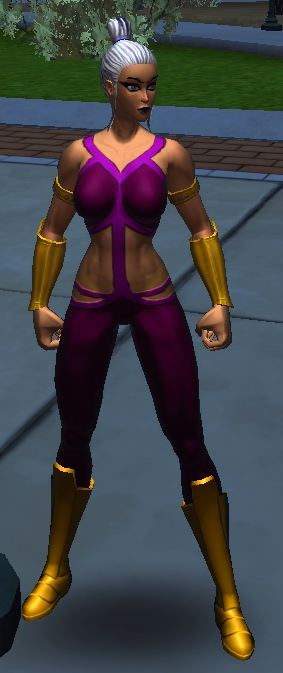Difference between revisions of "The Phoenician"
TheCegorach (Talk | contribs) m |
TheCegorach (Talk | contribs) m |
||
| Line 48: | Line 48: | ||
|Equipment=Twin swords of Phoenician origin; handles are shaped like sea-serpents or dragons | |Equipment=Twin swords of Phoenician origin; handles are shaped like sea-serpents or dragons | ||
|Skills= | |Skills= | ||
| − | [[Category:Character]][[Category:Female]][[Category:Anti-Hero]][[Category:Lebanese]][[Category:Dual Blades]][[Category:Detective]][[Category:Melee DPS]] | + | [[Category:Character]][[Category:Female]][[Category:Anti-Hero]][[Category:Lebanese]][[Category:Dual Blades]][[Category:Detective]][[Category:Melee DPS]][[Category:@TheCegorach]] |
|}} | |}} | ||
Revision as of 09:30, 7 April 2016
Miriam Waddani (mother)
Hand-to-hand combat
Arshut Waddani is the daughter of a Lebanese shipping magnate. She was born and raised in Byblos, once a Phoenician city. Both of her parents are staunch Phoenicianists, a variety of Lebanese nationalism that views the Lebanese people as culturally and ethnically distinct from Arabs and emphasizes Lebanon's pre-Arab heritage, especially the history and culture of the Phoenicians. Not surprisingly, then, since childhood she has felt a strong spiritual connection to the Phoenicians. Since her teenage years, she has had an equally strong desire to recover and preserve their heritage. As an adult, she leads a double life while pursuing this goal.
As Arshut Waddani, she is known for privately financing archaeological expeditions around the Mediterranean, searching for the legacy of her ancestors. She will often join these expeditions herself, and has diplomatic credentials from the Lebanese Directorate General of Antiquities to assist her efforts. Despite several successful digs, she has only a handful of Phoenician pieces in her private collection. The vast majority of the artifacts uncovered in her endeavors have been donated to the National Museum of Beirut. The most notable exceptions are the twin swords she found in at a Phoenician colony site in Spain. These swords were remarkably well-preserved, despite being roughly 2500 years old, and are her greatest treasure.
As the Phoenician, she uses her wealth and connections to identify, track down and recover looted antiquities from smugglers and black marketeers. She pursues such criminals with a religious fervor. She will always give illegal traders a warning and a chance to desist their illegal activity, though she will insist on confiscating any stolen artifacts. If they decline, or if she catches them doing it again, she will use force. Though she will not initiate it, The Phoenician will not hesitate to use lethal force if her opponents do so.
She has so far managed avoid any legal entanglements, keeping a low profile and using hit-and-fade tactics to evade the authorities. Being a teleporter helps, as does the fact that her targets are typically criminals, and thus in no position to turn to the police for help. Moreover, truth be told, the governments in many of the countries she operates in are weak, corrupt, or outright dysfunctional, and lack the funding, the ability, the manpower, and/or the will to respond to her activities. Of late, this includes the Lebanese government as well, and Arshut finds herself in a difficult position: the officials charged with preserving Lebanese history and artifacts appear to be instead engaged in widespread disregard for their duties, or even wholesale looting of the very treasures they are supposed to be protecting. Her targets have correspondingly become more high-profile, and it is only a matter of time before she crosses paths with someone important enough that her actions cannot be ignored any longer.
